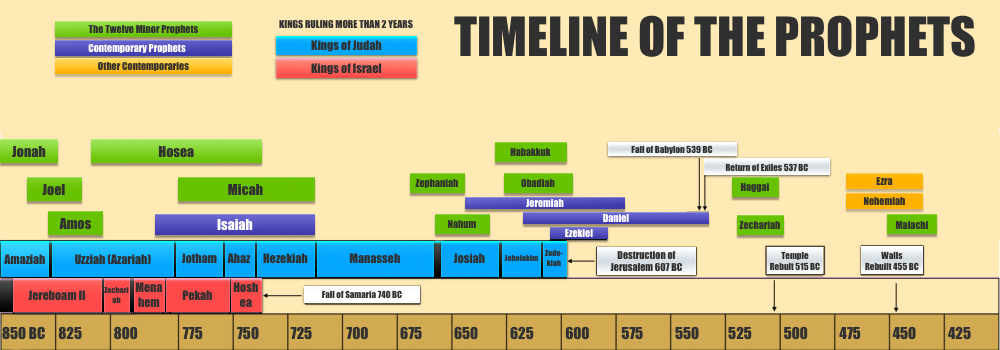Week 23 Study Page - Hosea, Joel, Zephaniah & Habakkuk
Week #23 Study Page
Hosea (1-14)
Joel (1-3)
Zephaniah (1-3)
Habakkuk (1-3)
Suggested Daily Reading Breakdown
Sunday – Hosea 1-3
Monday – Hosea 4-7
Tuesday – Hosea 8-11
Wednesday – Hosea 12-14
Thursday - Joel (1-3)
Friday - Zephaniah (1-3)
Saturday – Habakkuk (1-3)
Degree of difficulty: 6 out of 10 (explanation:). Get ready for a healthy dose of doom. Although this week's reading only has 23 chapters (slightly less than our average weekly place) it is relatively long according to word count. The nations of Israel and Judah have been sinful, and those sins will result in judgment and punishment from the Lord. Each of these prophets holds out this impeding doom to his audience, sometimes reflecting on the punishment they have already suffered, and pleas with God's people to repent and rejoin faithful worship to Yahweh. As with each Biblical prophet, it will be crucially important (possibly with the exception of Joel) to know the historical audience and setting to and in which his message was delivered - we'll do our best to sort that out below. try to read the book information and maybe watch The Bible Project video for each of these books before you start them, because the historical setting of the audience will be key to understanding the point that the prophet is making.
We'll be reading 4 different prophets this week, so lets talk about what a prophet is. It would be a mistake to understand a prophet as simply a "future teller" that perception is largely a modern construal and likely the result of watching too many sensational pseudo-documentaries about Nostradamus on the History Channel. Biblical prophets are primarily concerned with the present much more than they are with the future. They were there to serve as a mouthpiece through which God could express his approval or disapproval (as you'll see He's a little heavy on the latter) and to be a minister of change to his immediate audience. Walter Bruggeman says this about the prophetic task in his fantastic book The Prophetic Imagination
"The task of prophetic ministry is to nurture, nourish, and evoke a consciousness and perception alternative to the consciousness and perception of the dominant culture around us."
Prophets accomplish this task by criticizing the dominant consciousness of the time and energizing communities to a different (higher) consciousness and life often propelled by a renewed teleological awareness ('knowing where this all is headed'). In Biblical prophecy this task is often introduced by a (sometimes thorough) statement of grief and frequently concluded with a doxology of praise
About the Book(s)
Hosea
Date of Authorship: Hosea's ministry likely spanned three decades; from 752 to 724 AD. This would take Hosea from the reign of Jeroboam II as mentioned in 1:1 to the period of the Syro-Ephriamite war mentioned in 5:8-14 and elsewhere. These crucial decades witnessed the precipitous fall of Israel from their most powerful position under Jeroboam II, to a vassal-state of the ascendant Assyrian empire - which would smash Samaria and take Israel into exile soon after the end of Hosea's ministry. Understanding this rapid descent of Israel and the immediate threat of invasion posed by the burgeoning Assyrian empire are key to understanding the message of Hosea.
Author: Hosea is the author of this book. We know little about him other than what his writing reveals. He was from the northern kingdom of Israel and his writing shows and intimate and affectionate knowledge of the geography and husbandry there.
Purpose: Faithfulness is the primary theme of the book of Hosea. Chapters 1-3 serve as the core of Hosea's teaching for which the remaining 11 chapters seem to be an expansion. The opening scene of Hosea's ministry and its conclusion in the beginning of chapter 3 is among the most poignant and striking fables of the Bible. The drama of this Prophet of Yahweh taking a prostitute for a wife who bears him children of unfaithfulness (notice who is said to be the father of Lo-Ruhamah and Lo-Ammi), leaves him completely to pursue her ignoble profession, and God's instruction to go purchase her back from harlotry - i believe - matches any of the great theater in history. This scandalous union is a message from God to his people about how they have treated him and the lengths He (God) will go to in order to preserve them regardless. Hosea levies two primary complaints against Israel, they have worshiped other gods (especially the Canaanite god, Baal) and that they have been living morally corrupt lives full of injustice and oppression. Hosea is there to tell them that Israel has completely misunderstood what pleases God, they are out of time to right the ship, but God will preserve Israel because of his own faithfulness to his promise.
Joel
Date of Authorship: The date of Joel is uncertain. Those attempting to pinpoint it have suggested dates as early as the 9th century, and as late as the 4th century BC with modern scholars trending toward later dates. Thankfully there are no cardinal points of orthodoxy at stake when determining a date for this book. Joel is not necessarily about a geo-political, historical situation, but about a plague of locusts which has wreaked havoc in Judah. If you watch the adjacent Bible Project video, you will notice that they settle on a later (post-exilic) date and understand Joel to have incorporated much of earlier canonical writing into his prophecy. I would caution that there are those (like the creators of the OT timeline picture above) who believe that the themes and words of Joel are the source material for those later prophets, and think that Joel may be the earliest prophetic contribution to the canon.
Author: We don't know much about Joel. his numerous references to "Zion" and "Jerusalem" seem to betray that he is ministering to Judah and he is familiar with the priestly operations at the temple (1:9, 1:13) but likely not a priest.
Structure: Joel has a pretty clear 2-part structure, but there is not agreement on where to to split it. somewhere between 2:18 and 2:27, the book of Joel changes from a lament over the present reality of a plague of locusts that has ravaged Judean agriculture, to Yahweh's response to this lament which includes a projection of the future realities of the eschatological age.
Purpose: Joel is a response to a calamity that is sent by God on Judah. after lamenting the tragedy of this plague of locusts, the prophets energizing vision is a promise of a future where God confronts the evil of the nations, the land of all the world is restored by the bounty of his presence, and God's spirit will fill all of His people. Also, "Joel" is a really great name.
Zephaniah
Date of Authorship: Zephaniah is likely written between 640 and 632 BC.
Author: We know little about Zephaniah, other than the fact that he was from Judah. it is unsure whether or not the Hezekiah listed fourth in Zephaniah's genealogy (1:1) is king Hezekiah of Judah, commentators are divided on that issue.
Setting: Zephaniah is written during an extremely evil period during the history of Judah. Hezekiah had led a great reform and promoted true worship of Yahweh during his reign (in the time of Isaiah). However, Hezekiah's son, Manasseh, was the worst of the kings of Judah. His long (55-year!) reign saw Judah adopt and enjoy Idol worship to a greater degree than an time prior or hence. Although Zephaniah is writing during the reign of King Josiah, he is writing at the very beginning of Josiah's reign before his reforms that occur in 621 which are recorded in 2nd Kings 22 and 2nd Chronicles 34-35. Judah's wickedness is so great that Zephaniah's prophecy will come true despite Josiah's last minute reforms.
Purpose: C. Hassell Bullock writes that "Zephaniah's reading of the popular religious attitude includes an awareness of those people whose hearts were stagnant and who thought that Yahweh was stagnant too, uninvolved in Judah. They concluded "The Lord will not do good or evil" (1:12). Zephaniah announces the coming day of the Lord that should bring terror to the evil people of Judah. Just like all the other nations, Judah will be punished for their evil and exempted no longer. This punishment will purify a people truly devoted to, and sustained by God.
Habakkuk
Date of Authorship. While Habakkuk does not mention a date or even a king in his book, most scholars agree that he ministered during the latter part of Jehoakim's reign, between 605 and 598 BC. Babylon had already defeated Judah by this point, but the final and terrible destruction of Jerusalem would not occur until 586 BC.
Author: Habakkuk wrote this book, but we know nothing about him.
Purpose: Unlike the other prophets whom we have read this week. Habakkuk is not words directed towards people by God, but an exchange of words between God and a prophet. Habakkuk is distraught to see not only the punishment which has befallen Judah, but also recognizing the further punishment which awaits and asks God to explain why any of this is fair. God answers him and explains that Judah's oppressors will also be punished along with all who do evil, and Habakkuk concludes by praising God for His providence.
As you Read Notes
Hosea: Knowledge of God
Here is a quote that I found helpful concerning Hosea's message to Israel:
"This general description of faith is the consummate demand of Yahweh upon Israel:
"For i desire mercy not sacrifice,
and acknowledgement of God rather than burnt offerings"
The knowledge of God (acknowledgement in NIV '11) was also at the heart of Isaiah' message to Judah, as it was in Ezekiel's prophecy several generations later. It was, as we have observed, far more than a mere cerebral function, for it included man's will and emotions. Rather than a function of the mind it was the reflex of the total person, the response of one to God and His revelation of Himself in law, history, and prophetic word. Even though we must be cautions in speaking of synonymous concepts in the Old Testament, we might suggest that the knowledge of God was to the prophets who use the phrase what the fear of the Lord was to the wisdom writers and the psalmists. It is the totality of Man's relationship to God. Hosea understood that Israel was tragically mistaken in her assumption that she knew God: "They cry out to Me, ' My God we of Israel know thee' (8:2). The deficiency itself was tragic, but believing that the deficiency did not exist was fatal.
(C. Hassel Bullock Prophetic Books, 123-124)
The Locusts of Joel
"Locusts were all too common in the ancient Near East and were notorious for the devastation and havoc they brought. the locusts breed in the region of the Sudan, Their migration would strike in February or March and would follow the prevailing winds either to Egypt or Palestine. A locust will consume its own weight each day. Locust swarms have been known to caver as many as four hundred square miles, and even one square mile could teem with over 100 million insects. If the locusts laid their eggs before being blown out to sea, the problem would recur in cycles. A single female laying her eggs in June could potentially result in eighteen million offspring within four months... The ecological destruction could cripple the economy for years. Sometimes fields would be so damaged as to have greatly reduced fertility. The destruction of trees would have even more devastating effects on the ecological balance. Not only would shade and wood supply be lost, but topsoil erosion would increase and the loss of forestation's contribution to the environment would accelerate the development of wasteland conditions."
The IVP Bible Backgrounds Commentary: Old Testament 760-761



